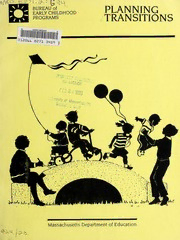
Guide to planning transitions for young children and their families PDF
Preview Guide to planning transitions for young children and their families
PLANNING BUREAU of EARLY CHILDHOOD TRANSITIONS PROGRAMS 3i20t.b 0^71 3^0^ ^A ^ Jnim (uA,i M . < Massachusetts Department of Education o^sc:LH 3^^ MASSACHUSETTS BOARD OF EDUCATION Martin S. Kaplan, Esquire, Chairperson, Newton Mr. William K. Irwin, Jr., Vice Chairperson, Wilmington Ms. Eleanor W. Bliss, Westfield Mr. John J. Gould, Boston Dr. Jerome H. Grossman, Chestnut Hill Dr. Madelaine S. Marquez, Amherst Mr. S. Paul Reville, Worcester Dr. Ricnard R. Rowe, Belmont Rev. Michael W. Walker, Brockton Dr. Joan Wallace-Benjamin, Dedham Ex Officiis (Voting Privileges) Mr. John David Cashman, Marblehead, Chairperson, Student Advisory Council Dr Piedad Robertson, Secretary, Executive Office of Education (Non-voting Privileges) Mr. Paul G. Marks, Chancellor, Higher Education Coordinating Council Ms. Rhoda E. Schneider, Acting Commissioner and Secretary to the Board of Education The Massachusetts Department of Education insures equal employment/educational opportunities/affirmative action regardless of race, color, creed, national origin or sex, in compliance with Title VI and Title IX, or handicap, in compliance with section 504. Publication # Approved by State Purchasing Agent 6-92 MASSACHUSETTS DEPARTMENT OF EDUCATION BUREAU OF EARLY CHILDHOOD PROGRAMS MASSACHUSETTS DEPARTMENT OF PUBLIC HEALTH PROGRAMS SERVING CHILDREN BIRTH THROUGH TWO AND THEIR FAMILIES 1991 THIS DOCUMENT WAS PREPARED BY Linda Warren, Ph.D. Director, Collaboration for Children Project Sandra Putnam Franklin, M.Ed. Interagency Coordinator Massachusetts Department of Education Bureau of Early Childhood Programs Division of School Programs ACKNOWLEDGEMENTS TRANSITION POUCY TASK FORCE Massachusetts Department of Education Linda Warren, Co-chairperson Alice Barton Sandra Putnam Franklin Elisabeth Schaefer Massachusetts Department of Public Health Donna Haig Friedman, Co-chairperson Andrea Schuman Leah Curtis Linda Fox Linda Schaeffer Ann Taylor We also wish to acknowledge the efforts of individuals from the Collaboration for Children Project and others who provided support in the development of the Guide To Planning Transitions as follows: Kathleen Fraser, Project Coordinator Gerry Sligar, Project Coordinator Early Childhood Coordinator Preschool Coordinator Arlington Public Schools Lynn PubHc Schools Leah Curtis Katy Flory, Project Coordinator Program Director Preschool Transition Coordinator Winchester Early Intervention Program Gill-Montague Regional School District Ann Linehan Tracy Osbahr Executive Director Program Director Head Start/Communities United, Inc. REACH Early Intervention Waltham Northampton Meg Barden Cline Jean Ferris Professor of Child Development Parent University of Massachusetts, Amherst Northampton Elizabeth Leutz Pamela Simpkins Margaret Mahoney Mary Conway Anne Sullivan Center Lowell Public Schools Early Intervention Program Tewksbiiry Christine McGrath Administrator of Special Education Gloucester Public Schools PREFACE Smooth, supportive transitions from infant-toddler programs to preschool programs and then to kindergarten programs are essential to the educational adjustment and development of young children. The Department of Education, the Department of Public Health, the Office of Human Development Services (Head Start) and the Executive Office of Human Services are committed to facilitating smooth transitions for all young children. This Guide was developed to provide materials for practitioners to draw upon when planning transitions for young children with special needs or at risk of having special needs. The Guide includes the following elements which can be used independently or as a whole: • Policy on Early Childhood Transitions (Section I). The policy has been written by the Massachusetts Department of Education smd the Department of Public Health and is supported by the Executive Office of Human Services, the Office of Human Development Services (Head Start) and the Department of Mental Retardation. The policy is based on the idea that local service providers, who know the children, their families and the services available are most effective in developing procedures and activities to support the child and the family during transitions. • Guide To Interagency Transition Planning (Section II). A three-year project was funded by the Department of Education to create models of transition through interagency collaboration among Early Intervention, Head Start and child care programs serving young children with special needs. The Guide is based on the experience gained through the Collaboration for Children Project and is designed to support professionals in areas related to interagency collaboration. • Five Case Studies (Section III) illustrating various ways in which the transition process may be implemented through collaboration. The case studies depict children with developmental delays or more complicated medical diagnosis moving from an Early Intervention program to Head Start, day care and/or special classes or integrated programs supported by local school systems. • Transitions from a Family Perspective (Section IV). Written by the parent of A a child with special needs, "Turning Three: Family Perspective", is a first-hand account of how one family worked out a thoughtful program for their child as he made the transition from Early Intervention to a preschool program. Strategies to assist parents in getting started and important details to address during the process are highlighted. We hope this Guide will be a useful resource for staff development, for parents with children transitioning from one agency to another or to assist in the development of local collaborative transition procedures among agencies.
